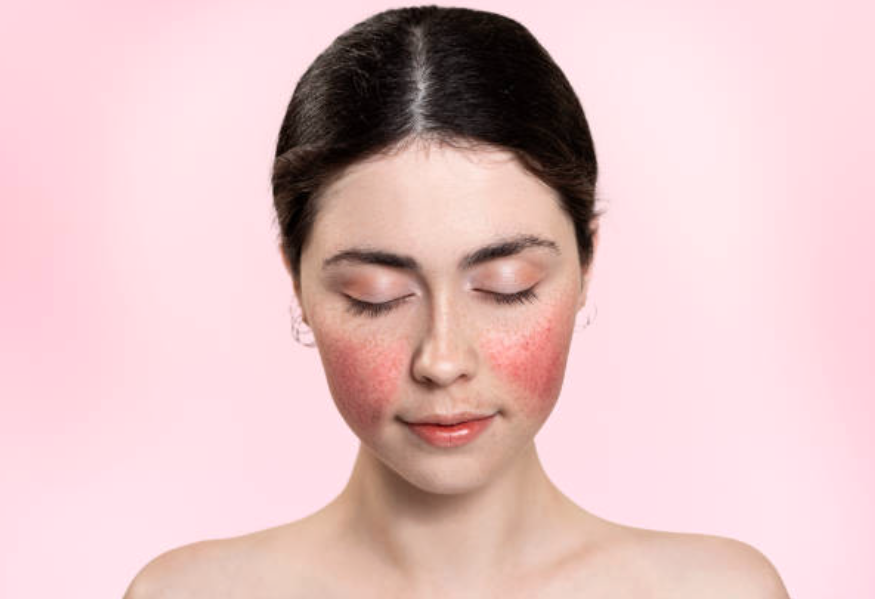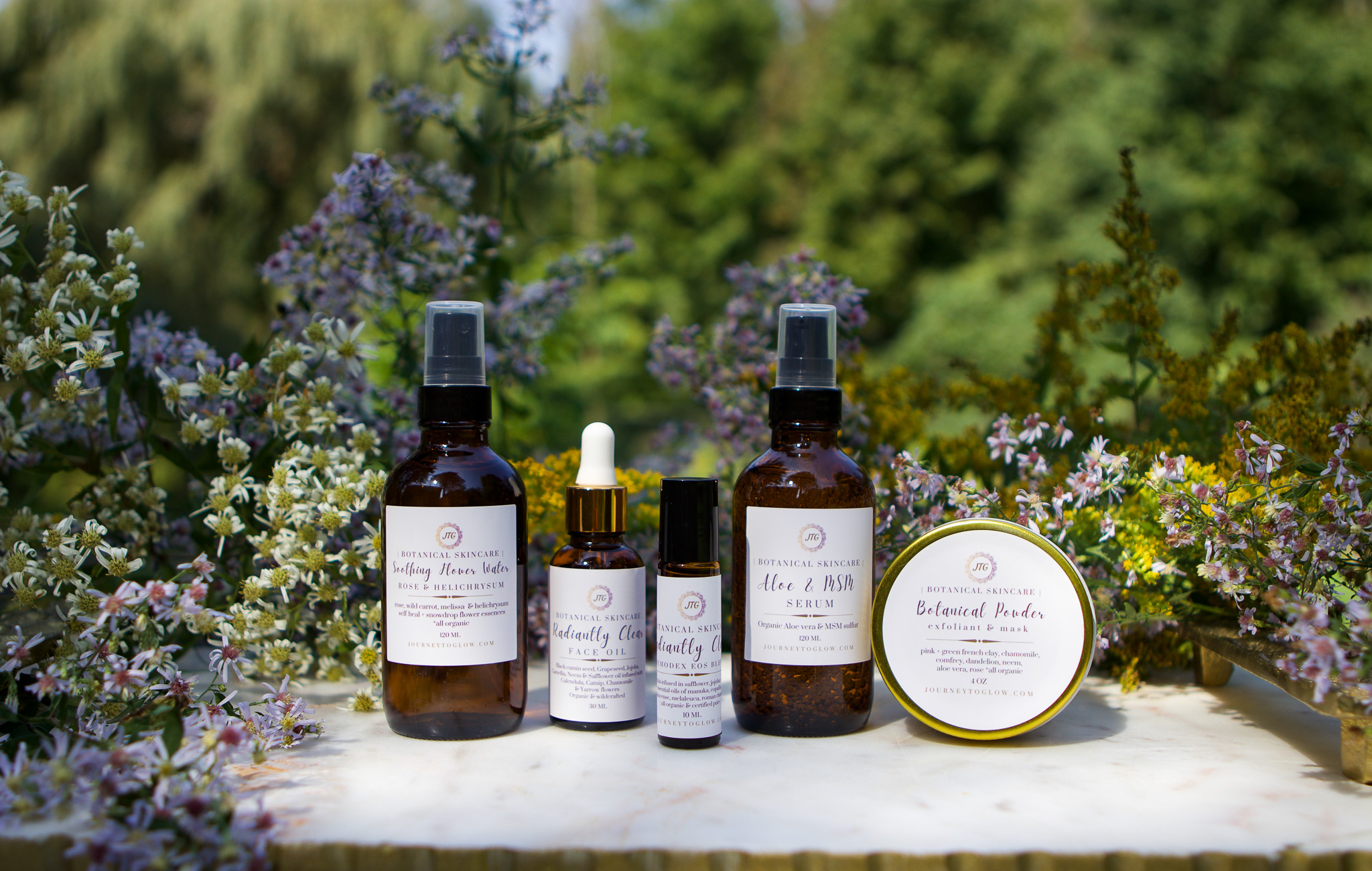Exploring the Underlying Root Causes of Rosacea
In this blog post, we’ll explore the underlying root causes of rosacea and the contributing factors that may lead to its development.
Let’s start with a better understanding of what is rosacea…
Rosacea is characterized by inflammation manifesting as redness, visible blood vessels, and occasionally small, red, pus-filled bumps. While conventional approaches often involve using pharmaceutical creams, antibiotics, and other medications to “treat” rosacea, these methods rarely result in true healing.
To achieve complete healing, it’s essential to understand and address the root causes of rosacea.
Genetics as a Potential Root Cause?
A cursory search on the origins of rosacea suggests a genetic component, with research indicating a hereditary link. Individuals with a family history of rosacea may be more predisposed to developing the condition due to specific genetic markers.
However, in my Functional Nutrition practice, I have not seen genetics to be a root cause as many of my clients report not having any family member with rosacea.
Furthermore, recent studies show that genetics only contribute to 10% or less of the outcome. On the other hand, epigenetics, which encompasses factors influencing genetic expression, accounts for over 90%. This challenges the notion that we have no control over the genetic aspect of rosacea, emphasizing the importance of nutrition, lifestyle, and identifying root causes.
Immune System Dysregulation As a Root Cause of Rosacea
Lately, the immune system’s involvement in rosacea is gaining attention among researchers. An abnormal immune response leading to inflammation has been shown to contribute to the characteristic redness, breaking out and even the presence of Demodex mites associated with rosacea.
Triggers such as food sensitivities, pathogens, and a leaky gut stimulate the immune system, exacerbating rosacea symptoms. Addressing gut and liver health therefore becomes crucial in not only mitigating these triggers (which brings immediate relief) but to also get to the root causes of rosacea.
Vascular Abnormalities
Vascular abnormalities, where blood vessels near the skin’s surface dilate excessively, contribute to increased blood flow and redness in rosacea. Factors like sun exposure, spicy foods, and alcohol can worsen these vascular changes, but addressing these triggers is only a part of the puzzle. To fully heal rosacea, a deeper exploration beyond the skin is necessary.

Cathelicidin LL-37 and Rosacea
Research indicates an increase in cathelicidin LL-37 in rosacea-affected skin, a peptide with proinflammatory properties. While this sheds light on the physical manifestation of rosacea, understanding why cathelicidin LL-37 increases in the first place remains crucial.
Microscopic Demodex Mites and Bacteria
Demodex mites and certain bacteria, particularly Helicobacter pylori, have been explored as potential contributors to rosacea. While not definitive causes, these associations provide insights into the intricate relationship between the skin, the gut microbiome and its microscopic inhabitants.
Environmental Triggers and Toxicity
Sensitivity to environmental triggers, such as sunlight and certain skincare products, influences rosacea flare-ups but is considered an influencing factor rather than a root cause. This is why, using non-toxic skincare formulated for rosacea is crucial not only to preserve good barrier function but to limit toxicity. On the other hand, environmental toxicity, stemming from exposure to mold, chemicals, and heavy metals, can be a fundamental cause of rosacea.
Gut Dysbiosis and Pathogens as Root Causes of Rosacea
Consideration should be given to gut-related factors like food sensitivities, leaky gut, SIBO, parasites, and candida as potential root causes of rosacea. Addressing gut dysbiosis therefore emerges as a crucial step in healing rosacea.
The Impact of Hormonal Imbalances in Rosacea
Hormonal fluctuations or imbalances can influence the development and exacerbation of rosacea, highlighting the interconnectedness of physiological processes, including skin health. More on this complex topic in a future article.
And last but not least, let’s not forget the emotional root cause of rosacea…
Emotional Roots of Rosacea
The emotional root cause of rosacea, often overlooked in my opinion, can be linked to traumas established in childhood, manifesting later in life as skin conditions like rosacea. This is another complex topic that we explore in-depth with Nadeije in our program Self-Heal.
Rosacea’s root causes are intricate, involving genetic + epigenetic, immune, vascular, environmental, and emotional factors. Shifting the focus from surface-level treatments to addressing internal inflammatory issues is crucial in healing rosacea.
With the right support and guidance, clear skin is possible.
Never give up,
Caroline Dalia Kaliani
Skin Herbalist & Functional Nutrition Practitioner
Need guidance on your skin healing journey?
The Radiantly Clear Skincare System
The Radiantly Clear Rosacea / Demodex Botanical Skincare System contains 5 products, each formulated with pure plant botanicals that support the healing of inflamed rosacea-prone skin while making the skin’s microbiome (the terrain) unfavorable to Demodex mites.

Rosacea Articles
Can you heal rosacea? Client success!
Can you heal rosacea? Client success! If you’ve ever felt frustrated or stuck in your journey to heal rosacea, I have something special for you. I recently sat down with Jessica, a client who’s completed my Vibrant & Radiant program. Her transformation is nothing...
Glow From Within: Best Supplements For Clear Skin (Especially Rosacea)
Glow From Within: Best Supplements for Clear Skin (Especially for Rosacea) When it comes to healing rosacea, what we put into our bodies is just as important as what we apply to our skin. If you’re dealing with rosacea, you know that redness, irritation, and flare-ups...
Rosacea skincare Demodex mites {Journey To Glow}
Rosacea Demodex Skincare Tips Live Zoom Community Call with Q&A Topics discussed in this video: Why I studied Functional Nutrition & Herbal Medicine for rosacea Why I created these products for Demodex mites (my personal journey) Brief overview of steps to...
{Video} Skincare Tips For A Rosacea Skin Crisis
Rosacea Skin Crisis Skincare Tips Live Zoom Community Call with Q&A I want to answer questions about the Radiantly Clear Rosacea / Demodex Skincare System and how to best use the products when your skin is in crisis. Please keep your questions coming, I will...
The Intricate Connection Between Liver Health and Rosacea
The Intricate Connection Between Liver Health and Rosacea Before we dive into the intricate connection between liver health and rosacea, let's take a look at how rosacea is defined by allopathic medicine. What is rosacea Rosacea, a chronic (but not incurable) skin...
How To Use The Rosacea Demodex Skincare System
I know it can be tricky to shop for natural skincare for rosacea, especially with highly reactive skin. So I made a few videos to show you step-by-step how to use the Radiantly Clear Rosacea / Demodex Botanical Skincare System. I'm also sharing skincare rituals +...







